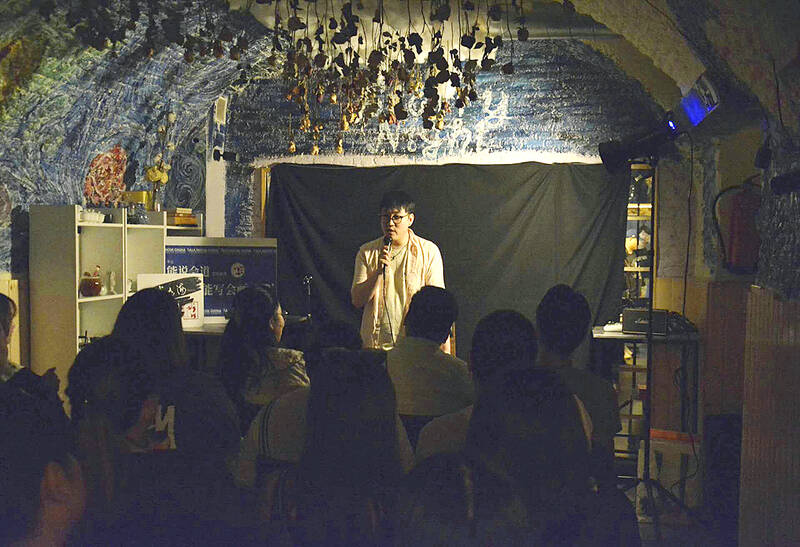Comedian Xi Diao says he knows he should avoid talking politics on stage, but sharing a family name with Chinese President Xi Jinping (習近平) makes it hard to resist.
Even his name is politically sensitive, the Melbourne-based amateur comedian tells audiences, setting up a joke about a group chat on the Chinese messaging service WeChat being shut down as soon as he joined it.
The 33-year-old civil engineer gets nervous laughs whenever he breaks a de facto rule of Chinese comedy: Don’t say anything that makes China look bad. To most comedians, that means no jokes about censorship, no mentioning the president’s name and no discussion of China’s extraordinarily strict COVID lockdowns or social topics like domestic violence.

Photo: AP
“It is a pity, if the environment were open, there would be somebody world-class coming up,” Xi said.
Mandarin-language standup comedy is growing, and not just in China. The medium has taken off in the last decade, and China’s expatriate population has established clubs in cities like New York, Tokyo and Madrid.
Comedians are known for bristling at limits, but most Mandarin-language comedians, and many fans, say some topics have no place in the comedy club.

Photo: AP
In China there are censors who review jokes in advance, and punish performers who cross political red lines. Earlier this year, an entertainment company was fined about US$2 million when star comedian Li Haoshi (李昊石) made a joke that referenced a Chinese military slogan.
Overseas, comedians say they don’t fear punishment, but most say political jokes aren’t funny, or make people uncomfortable. Many are not very familiar with political humor, after growing up in a country that largely censors it.
“We make what the audience likes,” said Guo Jia, a businessman who runs a comedy club in Tokyo. He said discomfort with politics is part of Chinese culture, comparing it to sensitivities about race in the US.
“There are some areas where people won’t go, but it’s not typically because of government policies, but more social pressure or culture or religion,” said Michel Hockx, a professor of Chinese Literature and director of the Liu Institute for Asia and Asian Studies in University of Notre Dame.
Comedians do push on social boundaries.
For Lin Dongxiao, a 28-year-old comedian who began performing while living in Toronto, it was a chance to talk in public about a congenital disorder that causes limp, and to get crowds laughing with him about how Chinese society treats people with disabilities.
Lin, who performs under the stage name “Guazi,” told an audience that women he met online complained that he didn’t warn them he had a disability, so he added it to his dating profile.
“You’re scrolling … oh gym trainer, nice body; business executive, million-dollar salary; and then…third-class certificate of disability without any allowance.” People burst into laughter.
Standup fan Wenlai Cai, a Los Angeles-based software engineer in her early 30s, said that she enjoys hearing jokes about LGBTQ life and race relations, topics that are strictly off limits in the mainland.
But “there should be limits on (jokes about) high level politics” Cai said. “That is, political leaders, partisanship … I don’t think it’s meaningful to talk about.”
There are also a few venues that defy Beijing’s sensibilities. Women’s Idea, a feminist group in New York City, hosts uncensored comedy shows that often hit on politics, encouraging women to express themselves on social and political issues.
But even roundabout references to politics make most Chinese-language audiences uncomfortable, Xi said. After he performed at a Chinese restaurant in Australia, the owner asked him to be careful; at a standup competition, he got zero audience votes. He’s wound up performing almost exclusively at English-language venues.
Zhu Jiesheng, who runs a standup comedy club in Madrid, reviews other performers’ jokes before they go on stage, asking them to strike jokes that could cross political lines.
But when a comedian insisted on telling jokes about the Shanghai lockdown, Zhu didn’t stop him. The audience didn’t get the jokes, Zhu said, and it started arguments backstage, leaving him more convinced that politics and comedy don’t mix.
Comedians are very aware that people can get into trouble for what they say. Asked about Li Haoshi, comedians said he should have known better.
“Even if you do not make mistakes but someone else does, it affects the whole industry,” said Zhong Di, a 30-year-old student in Milan who also performs standup.
Lin, who recently moved back to China to pursue a career in standup, said the industry is still recovering from the crackdown set off by his joke.
The Associated Press couldn’t reach Li for comment, and the company that manages him didn’t respond to an interview request.
China has a record of harassing its nationals abroad for activism. It has also threatened international stars from abroad with boycotts or bans on performing in China. Nigel Ng, a Malaysian comedian based in the UK who created the popular character “Uncle Roger,” lost his Chinese social media accounts after a clip from a live show went viral in which he joked about China listening in through cell phones.
Vicky Xu, a Chinese-born journalist in Australia who also performs standup in English, said that Chinese people have a long history of cracking jokes about sensitive topics.
“If you look back at a lot of the movies or TV shows made in China like 20, 30 years ago, there are more political jokes than today. So how do you explain that?” she said.
Xu, whose work is critical of the Chinese government and who has received blistering blowback from China’s official media and nationalist trolls, said that politics affects people’s lives in China so much that not talking about it is “ignoring the elephant in the room.”
When comedians go back to China, they face restrictions beyond what they impose on themselves overseas.
Lin said censorship is important to prevent “chaos,” but submitting his material to censors weeks before performances is still a challenge.
“No one told me what I could say or not,” said Lin, “which is pretty hard. I just hand in whatever I have, and change it if it doesn’t get approved.”
In Australia, Xi doesn’t plan to stop kidding about his famous namesake.
“I’m nobody,” Xi said, “and after all, I have an Australian passport … I will keep telling these jokes.”

On April 26, The Lancet published a letter from two doctors at Taichung-based China Medical University Hospital (CMUH) warning that “Taiwan’s Health Care System is on the Brink of Collapse.” The authors said that “Years of policy inaction and mismanagement of resources have led to the National Health Insurance system operating under unsustainable conditions.” The pushback was immediate. Errors in the paper were quickly identified and publicized, to discredit the authors (the hospital apologized). CNA reported that CMUH said the letter described Taiwan in 2021 as having 62 nurses per 10,000 people, when the correct number was 78 nurses per 10,000

As we live longer, our risk of cognitive impairment is increasing. How can we delay the onset of symptoms? Do we have to give up every indulgence or can small changes make a difference? We asked neurologists for tips on how to keep our brains healthy for life. TAKE CARE OF YOUR HEALTH “All of the sensible things that apply to bodily health apply to brain health,” says Suzanne O’Sullivan, a consultant in neurology at the National Hospital for Neurology and Neurosurgery in London, and the author of The Age of Diagnosis. “When you’re 20, you can get away with absolute

May 5 to May 11 What started out as friction between Taiwanese students at Taichung First High School and a Japanese head cook escalated dramatically over the first two weeks of May 1927. It began on April 30 when the cook’s wife knew that lotus starch used in that night’s dinner had rat feces in it, but failed to inform staff until the meal was already prepared. The students believed that her silence was intentional, and filed a complaint. The school’s Japanese administrators sided with the cook’s family, dismissing the students as troublemakers and clamping down on their freedoms — with

As Donald Trump’s executive order in March led to the shuttering of Voice of America (VOA) — the global broadcaster whose roots date back to the fight against Nazi propaganda — he quickly attracted support from figures not used to aligning themselves with any US administration. Trump had ordered the US Agency for Global Media, the federal agency that funds VOA and other groups promoting independent journalism overseas, to be “eliminated to the maximum extent consistent with applicable law.” The decision suddenly halted programming in 49 languages to more than 425 million people. In Moscow, Margarita Simonyan, the hardline editor-in-chief of the